In light of the hand-wringing Stateside about what the U.S. official reaction to events in Iran should be, it’s interesting to take note of the reaction of a country whose stance arguably has more of a direct impact in Iran — namely, Turkey. Yigal Schleifer flags this Der Speigel interview, in which Turkish Foreign Minister Ahmed Davutoglu steps very gingerly around the issue of passing judgment on the Iranian election and political process. He also de-dramatizes the recognition of Ahmadinejad’s election “victory” as a mere diplomatic formality between “nations with friendly relations,” and explains why Western perceptions of Iran’s political […]
Middle East & North Africa Archive
Free Newsletter
The paradox of the situation in Iran is how such an opaque regime operating in such a confusing media landscape can be revealing so much about itself. One thing I’d add to the list of “minutae” to be watched are any Revolutionary Guard deployments to locations that are not on our list of “known knowns.” My hunch is that this is the kind of climate in which the regime will secure the most sensitive facilities involved in the nuclear program. Since any weaponization activity at this point has to be conducted in a “black site,” a major deployment could be […]
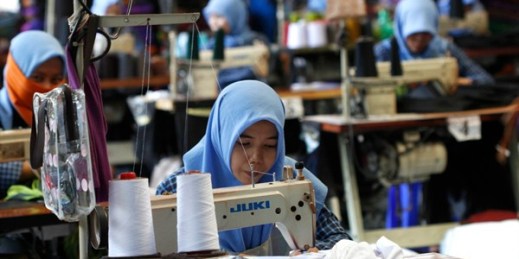
As we approach the 15th anniversary of the Fourth World Conference on Women, better known as the 1995 Beijing Conference, gender-equality advocates around the world are taking stock to assess what should come next. An honest reckoning that recognizes accomplishments, challenges and opportunities suggests that while progress has been made at policy levels, difficulties persist in translating policy into practice. Nevertheless, resources at the implementation level, if recognized, offer opportunities for gender equality to contribute not only to the well-being of women and girls, but also to more effective social and economic development. A Pervasive & Persistent Challenge: Defining Gender […]
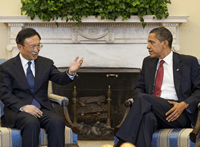
China’s global priorities might not match up that well with those of your average American policymaker. But they do match up quite well with President Obama’s agenda. That’s the sense I got after spending last week in Shanghai with a bevy of China’s top foreign affairs academics. Although the workshop I attended was focused on U.S.-Chinese relations, there was no shortage of side conversation on the post-election meltdown unfolding in Iran. And nothing I heard in terms of the Chinese sense of priorities bore any resemblance to what you see these days in American newspaper headlines. As during the Cold […]
To veteran news correspondents — including this one — who were in Tehran in 1979, some of the events unfolding last week were eerily familiar. Thirty years ago, as this past week, the violent ebb and flow filled the streets day after day, as the Shah’s security forces battled supporters of Ayatollah Khomeini. Yet thirty years ago, there were surprisingly few actual deaths: Iranian army personnel carriers and tanks were tucked away in side streets in Tehran waiting for the order to suppress the unrest. But the Shah, weakened by cancer and under pressure from the Carter administration to limit […]
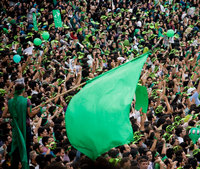
As we watch the dramatic events unfold in Iran, it is useful to reassess the merits of Iranian elections. Critics of the Islamic regime often dismiss presidential, parliamentarian (Majlis) and municipal elections as a manipulative sham used by a malevolent regime to flaunt its supposed legitimacy to the outside world. They may point to the current crisis as proof of their claim. Obviously, elections alone in the Islamic Republic of Iran do not make the country an ideal and transparent democracy. They do, however, provide for two unintended, yet noteworthy, outcomes that are rarely reflected upon in the West. First, […]
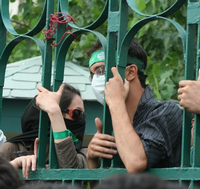
TEHRAN, Iran — Tehran has been the site of massive street protests on a scale unseensince the Islamic Revolution in 1979. Tens, and sometimes hundreds, ofthousands have defied government bans, live gunfire, tear gas and massarrests to protest against the election results and the government itself. The following are photos taken atopposition demonstrations in the aftermath of the contested electionresults. (George McLeod’s WPR Briefing on the escalating government crackdown on the protests can be found here.) Protesters with a picture of defeated reformist presidential candidate Mir Hossein Moussavi (George McLeod). The June 16 opposition protest demonstration snakes its way towards […]
Here is what the experts are saying about North Korea’s nuclear strike capabilities in response to Pyongyang’s threats to test another long-range missile on July 4: Gen. James Cartwright, Deputy Head of the Joint Chiefs of Staff, said on Tuesday that North Korea would need three to five years to be able to launch a missile that was capable of reaching the West Coast of the United States. Hawaii and Alaska are already in range. Yesterday, Defense Secretary Robert Gates said that the U.S. is ready and able to deal with any short-term threats to Hawaii “should it become necessary.” […]
There’s nothing really surprising about Iranian Supreme Leader Ali Khamenei’s speech today. (Andrew Sullivan’s got the full text, and the Guardian has a write-up.) And appearances to the contrary, there’s nothing really untrue about it, either. Yet. By that I mean that up to now, this really has been a conflict that has remained within the institutional structure of the state. By drawing the line today — and he really had no choice but to do so — Khamenei has essentially forced Moussavi to decide whether his opposition will remain in the realm of politics, or cross over into the […]
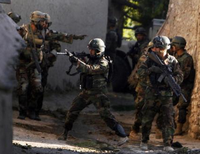
Winning American wars these days is four parts politics and just one part fighting. Contemporary military doctrine — counterinsurgency and stability operations — tasks soldiers, on the whole, with state-building. Victory, or at least success, means building from the bottom up, rather than destroying from the top down. But because conditions on the ground are so delicate, for the one part of warfare that remains fighting, there’s no room for error. With Gen. Stanley McChrystal taking charge of U.S. and NATO troops in Afghanistan on Monday, warfighting is on everyone’s minds. McChrystal has been appointed to command the Afghanistan war […]
In the days preceding this week’s historic meeting of the BRICs — Brazil, Russia, India and China — in Russia, Israeli Foreign Minister Avigdor Lieberman was in Moscow promoting Israeli-Russian ties. Lieberman took the opportunity to point out that Russian attitudes towards Israel were better than in a lot of Western European countries where, in Liberman’s calculus, sympathy for the Palestinians in the wake of Gaza amounts to anti-Semitism. Born in Moldova and a fluent Russian speaker, Lieberman was able to speak to Putin directly in Russian. Each pledged to develop ties further, to involve Russia in Middle East issues. […]
The global economic crisis is driving increasing numbers of impoverished individuals into the hands of human traffickers, according to this year’s Trafficking in Persons report released by the State Department this week. “Trafficking weakens legitimate economies, breaks up families, fuels violence, threatens public health and safety, and shreds the social fabric that is necessary for progress,” Secretary of State Hillary Clinton wrote in Wednesday’s Washington Post. Clinton warns: “The problem is particularly urgent now, as local economies around the world reel from the global financial crisis. People are increasingly desperate for the chance to support their families, making them more […]
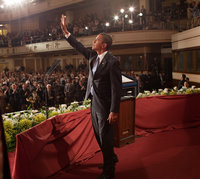
OSLO, Norway — President Barack Obama’s effort to forge peace between Israelis and Palestinians has taken an unexpectedly dangerous turn. Obama campaigned on a promise to start working for peace in the Middle East from the earliest days of his presidency. He kept his word, but he unwittingly unleashed a new round of diplomacy that is unfolding on the public airwaves, breaking with one of the most fundamental and indispensable tenets of diplomacy. Instead of allowing the parties to quietly negotiate their most politically sensitive differences, Obama has set the tone for grand speeches made before large audiences. This is […]
In her WPR column today, Frida Ghitis makes a very strong case for getting Middle East diplomacy off the podium and back into the negotiating room. As usual, it’s a great column, and the point is well taken. President Barack Obama has such a gift for oratory that it’s understandable he wants to use it to his advantage. But as Ghitis argues, loud public declarations tend to box in negotiating positions. That’s good if you have no intention of yielding and you basically just want to put your counterpart on the spot. But that doesn’t seem like a promising approach […]
It looks like the Iranian regime has found its strategy fordealing with the opposition: decapitate the organizational leadershipthrough targeted, “quiet” arrests, while co-opting the visibleleadership through open-ended “dialogue.” This is where thingsget very tricky for Moussavi to navigate. If he rejects the GuardianCouncil’s overtures out of hand, he is essentially rejecting theregime’s institutional legitimacy, thereby pushing him over the edgefrom protest into revolution and giving the regime a credible reason toshut him and his demonstrations down. But if he engages too earnestly,he runs the risk of losing momentum for the movement, with littlerecourse if the ruling ultimately turns out unfavorable, […]

In Iran, hundreds of thousands of citizens are bravely defying state laws barring protest, with reports emerging of students and demonstrators being beaten and even shot. President Barack Obama has muted his response so far, taking note of the violence, while taking pains not to feed historical Iranian perceptions of U.S. meddling. Some have criticized him for not taking a stronger stand, echoing widespread charges that Obama downplays human rights more generally in his foreign policy approach. The critics are right: Obama has prioritized stability and the shoring up of U.S. power over the vocal advocacy of human rights. But […]
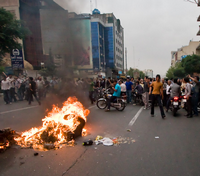
TEHRAN, Iran — Iranian authorities have ratcheted up their campaign against anti-government demonstrators by calling in the hard-line militia, the Basij, to enforce order with brute force. Tehran has been the site of massive street protests on a scale unseen since the Islamic Revolution in 1979. Tens, and sometimes, hundreds of thousands have defied government bans, live gunfire, tear gas and mass arrests. Thursday saw hundreds of thousands choking Enkeleb Street, a main thoroughfare — clad in black to mark the killing of eight protesters by the Basij, with many carrying white flowers or photos of their dead comrades. But […]
